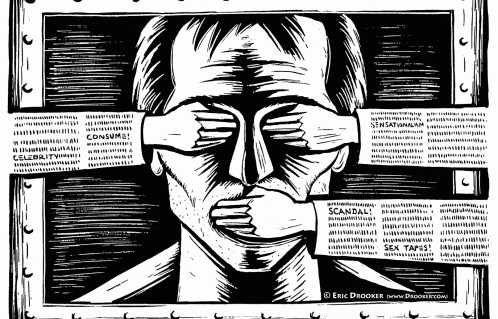Censors ‘Making a Comeback’ in Tunisia and Egypt
 It initially seemed as though Tunisia would be quick to cancel most literary censorship after the ouster of Zein El Abideen Ben Ali. But, following the interim government’s passage of a new censorship law, censors are “making a comeback.” They’ve begun by banning a number of websites, according to Global Voices Online.
It initially seemed as though Tunisia would be quick to cancel most literary censorship after the ouster of Zein El Abideen Ben Ali. But, following the interim government’s passage of a new censorship law, censors are “making a comeback.” They’ve begun by banning a number of websites, according to Global Voices Online.
Meanwhile, Egyptians came out in force yesterday to protect their right to free speech online, with a #noSCAF day of criticizing the Armed Forces. However, despite this day’s apparent success, relatively little has been said about the continued role of the Egyptian Censors’ Office in limiting literature.
The censors’ office officially doesn’t “ban literature,” as they are quick to state. However, they do continue to control imported books. Even Ibrahim Farghali’s acclaimed Sons of Gabalawy, which was printed in Egypt, has been prevented from re-entering the country. And several other avenues of censorship are also available.
Our friend Ali Abdel Mohsen reports on the censorship schizophrenia in today’s Al Masry Al Youm. While head of the Egyptian Board of Censors Sayed Khattab believes “we are living in the age of freedom,” he adds that “nobody can reasonably say we should just cancel the whole institution” of censorship.
Abdel Mohsen says that Khattab is quick to condemn the existing censorship laws. But the changes Khattab proposes don’t challenge the core of these laws. Khattab reportedly insists that censors have an important role in Egypt, which includes:
giving advice and knowledge to the public, and facilitating and encouraging ongoing dialogue between the public and the artists within a framework that does not offend any sensibilities.
(Cough.)
Officially, Egyptian authorities don’t censor books that are published within Egypt; they only control titles that are imported from abroad. Internal censorship laws still apply to theater and films scrips. However, those that concern books were lifted years ago.
However, august and award-winning Egyptian author Salwa Bakr told Abdel Mohsen, “that didn’t mean they stopped censoring, they just did it in different ways.”
Since distribution is monopolized by two government-owned agencies, they would distribute only a tiny fraction of the total printed copies of books deemed to be potentially troublesome, making them available in obscure selling points, while storing the other copies and claiming that “they just didn’t sell,” Bakr says.
Also, books can be censored after publication—yanked from shelves and their authors and publishers fined—as with Magdy al-Shafee’s graphic novel, Metro.
Indeed, censorship can take part at any place in the process: Khaled al-Berry’s Negative, for instance, was nearly censored by a man in the printing workshop who refused to work with the book because of its “obscene” sex scene. Fortunately, 20LE was enough to change the gentleman’s mind.
Many have said that it’s “too soon” to talk about dismantling censorship processes because of conservative Egyptian audiences. But Bakr told Abdel Mohsen that dismantling the office would provide “a shock that would benefit society, forcing people to reevaluate the role of censorship as well as topics that are supposedly taboo.”
Bakr told Abdel Mohsen:
We’ve lost so much because of censorship. Culturally, we’ve taken huge steps back.
Read more:
Anti-censorship movement in Tunisia: creativity, courage and hope!



You must be logged in to post a comment Login